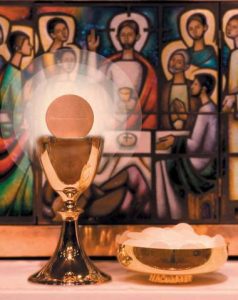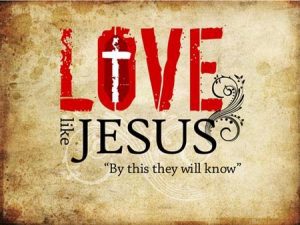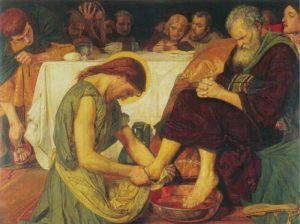Directions for the Journey
Jesus provides us with directions as we follow him.
As we travel this Catholic Spiritual Journey, following Jesus under the guidance of his Church, we need directions for this journey so as to avoid going the wrong way in life and to assure that we get to our desired destination.
[fruitful_tabs type=”default” width=”100%” fit=”false”]
[fruitful_tab title=”The Spirit and the Church”]
The Spirit and the Church Guide, Teach, and Witness
Catholics are given direction for the Spiritual Journey by the Holy Spirit: Jesus says that “the Helper, the Holy Spirit, whom the Father will send in My name, He will teach you all things, and bring to your remembrance all that I said to you.” (John 14:26)
Jesus entrusts the Holy Spirit to his Church and commissions his Apostles with the following commandment: “Go, therefore, and make disciples of all the nations. Baptize them in the name of the Father, and of the Son, and of the Holy Spirit. Teach them to carry out everything I have commanded you.” (Matthew 28:19,20a; emphasis added)

Jesus also gives to Peter “the keys to the Kingdom of God,” i.e. authority over the Church including definitive teaching authority: “I will give you the keys to the kingdom of heaven. Whatever you bind on earth shall be bound in heaven; and whatever you loose on earth shall be loosed in heaven.” (Matthew 16:19) The Catholic Church teaches that the Pope is the Successor of Peter and has a primacy in teaching authority and governing the Church.
The Catholic Church believes that her teaching authority, guided by the Holy Spirit, is entrusted to the Bishops of the Church, in communion with the Bishop of Rome, the Pope, who are the successors of the Apostles, and continue to carry out this commission of Jesus to teach through her ordained ministers and all the People of God.
It is therefore the Spirit and the Church who together guide us, teach us, and witness to Christ, “The Way, the Truth, and the Life,” (John 14:6) on our Catholic Spiritual Journey.
[/fruitful_tab]
[fruitful_tab title=”Scripture and Tradition”]
Scripture and Tradition
We receive directions for the journey by reading the Church’s Scriptures (the Bible) according to the Church’s Teachings (transmitted in various ways, but especially summed up in the Catechism of the Catholic Church).
Jesus originally gathered a group of intimate followers who are called the Apostles (literally the name means “the ones sent,” i.e. given a mission). These Apostles shared the life of Christ, heard his teaching, and ultimately were witnesses of his Resurrection. They were given authority by the Risen Christ to preach and teach his Gospel, making disciples of all nations (see Matthew 28:19).
The life and teachings of Jesus were first preached orally by the Apostles, who also founded Christian communities (Churches) throughout the Roman Empire and beyond. Much of the preaching and teaching of the Apostles were written down (these become the Scriptures of the New Testament), especially as the Apostles began to die. They entrusted their Apostolic authority to others, who would be called Bishops.
The Church, with its leaders, the Apostles and Bishops, taught all that Jesus intended to be taught for his followers. The whole of this teaching is the Tradition (literally what is handed down to be believed), also contained implicitly and explicitly in the Sacred Scriptures (the New Testament, but also the Old Testament, as well). Not all of the Tradition is written in the Scriptures, but the Scriptures do have a special primacy for they are inspired by the Holy Spirit, and are the very Word of God.
The Tradition (what the Church believes), is also contained in the teaching of the early Church’s leaders, called the Fathers of the Church, and in the liturgy, i.e. the public prayer and worship by the Church, and the teachings of the Church regarding faith and morals. (See Catechism #11) The Creed of the Church, especially the Apostle’s Creed and the Nicene Creed, sum up some of the most imortant teachings of our Tradition, but not all. (For example it mentions nothing about the Eucharist, which is central and essential to our Catholic Faith; but the Creed is usually professed within the Eucharist–so it is assumed. It is like if we talked about swimming without mentioning water: but everyone presumbably knows that swimming requires water; so Catholic Faith requires the Eucharist)
The relationship between the Scripture, the Tradition and the Magisterium (the teaching authority of the Pope and Bishops) has been much discussed, but it is the original approach of the early and then Medieval Church until it was challenged by the Protestant Reformation in the 16th century, the Protestants claiming the novel teaching that only the Scriptures (sola Scriptura) teach all that Jesus taught and lived. However, the Catechism sums up the Catholic approach, the roadmap, so to speak, for the Catholic Spiritual Journey:
“It is clear therefore that, in the supremely wise arrangement of God, sacred Tradition, Sacred Scripture and the Magisterium of the Church are so connected and associated that one of them cannot stand without the others. Working together, each in its own way, under the action of the one Holy Spirit, they all contribute effectively to the salvation of souls.” (#95)

[/fruitful_tab]
[fruitful_tab title=”The Eucharist as Direction”]
The Eucharist as Direction
An ancient maxim of the Church is that “the way of prayer is the way of belief.” In other words, what is prayed and celebrated in the Eucharist, especially, is how the Church believes. It is in the Eucharist that we communally  hear the Scriptures with the mind of the Church. The Eucharist gives us directions for our Catholic Spiritual Journey that teach by doing and example, as well as by word.
hear the Scriptures with the mind of the Church. The Eucharist gives us directions for our Catholic Spiritual Journey that teach by doing and example, as well as by word.
I have heard it said that “the Eucharist is doing the world the way God wants the world done.” Here are some ways the Eucharist directs what we are to do on our journey:
The Eucharist reminds us that we belong to God and that we belong to one another as the Church which gathers around the Eucharistic table/altar.
The Eucharist calls us to always and everywhere to give God thanks and praise (a phrase found in most Eucharistic Prayers). The very name Eucharist means thanksgiving (in the original Greek).
The Eucharist calls us to offer the gifts for which we give thanks and to offer ourselves to be united to the One Sacrifice of Christ in his Dying and Rising. The Eucharist reminds us that sacrificial love requires us to die to sin and selfishness by the power of the Spirit working within us and to rise with Christ in a new way of self-giving. Thus we recall over and over again the Death and Resurrection of Christ. (The Sunday Mass is perticularly important because it is the Day of Resurrection)
We also remember that he will come again in glory. Our celebration puts us in contact with the angels and saints worshiping in heaven and we remember our destination is heaven.
The Eucharist gives us the Real Presence of the Risen Christ who comes to dwell within us. We receive the Whole Christ, and so remember that we are one Body, the Church, inspired by one Spirit to the glory of God the Father.
The Eucharist commits us to the poor (Catechism#1397), for Christ is also present also in the poor. (See Matthew 25:31-46)
We must gather on the First Day of the Week, the Day of Resurrection, to begin our week in worship of God with one another, and to receive the Lord’s directions for our life, fleshed out in the celebration of the Mass. We gather on the first day of the week, Sunday, to put God first in our lives. We then “go in peace, glorifying the Lord” by our lives. (one of possible Dismissals at Mass).
[/fruitful_tab]
[fruitful_tab title=”Making the Directions”]
Making the Directions Simple

The traveler may wonder if the roadmap is too complicated to give clear direction for the journey! After all, the Bible is a big book with many parts, some of them seemingly obscure. The Catechism of the Catholic Church has 2,865 articles! In addition, the lessons of the Mass take a lifetime to absorb.
We must realize, however, that the Person of Christ Jesus and his life is very rich in meaning; it is like mining a rich resource that never ends: one can go deeper and deeper into the Mystery of Christ. Like any deeply meaningful relationship, it’s not easy to sum up someone you love, admire, follow or share friendship.
The Gospel of John concludes with this note of recognition of the deep meaningfulness of Jesus that cannot be adequately captured by our limited human knowledge or even in the Scriptures only:
“There are also many other things that Jesus did, but if these were to be described individually, I do not think the whole world would contain the books that would be written.” (John 21:25)
Jesus did however give us a simple summary of his person, teaching, and life, and a summary of the Church’s Tradition and Scriptures:
“A Pharisee tested Jesus by asking, Teacher, which commandment in the law is the greatest, Jesus said to him, You shall love the Lord, your God, with all your heart, with all your soul, and with all your mind. This is the greatest and the first commandment. The second is like it: You shall love your neighbor as yourself. The whole law and the prophets depend on these two commandments.” (Matthew 22:36-39)
This great summary simplifies the direction by which we should travel the Catholic Spiritual Journey; or does it simplify things? The summary is simple but quite challenging to live. Jesus makes it even clearer when it come to loving one another what is expected, for he says:
“I give you a new commandment: love one another. As I have loved you, so you also should love one another. This is how all will know that you are my disciples, if you have love for one another.” (John 13:34-36)
He loved us sacrificially, in pure self-giving. This is how we are to follow him on the journey.

[/fruitful_tab]
[/fruitful_tabs]
